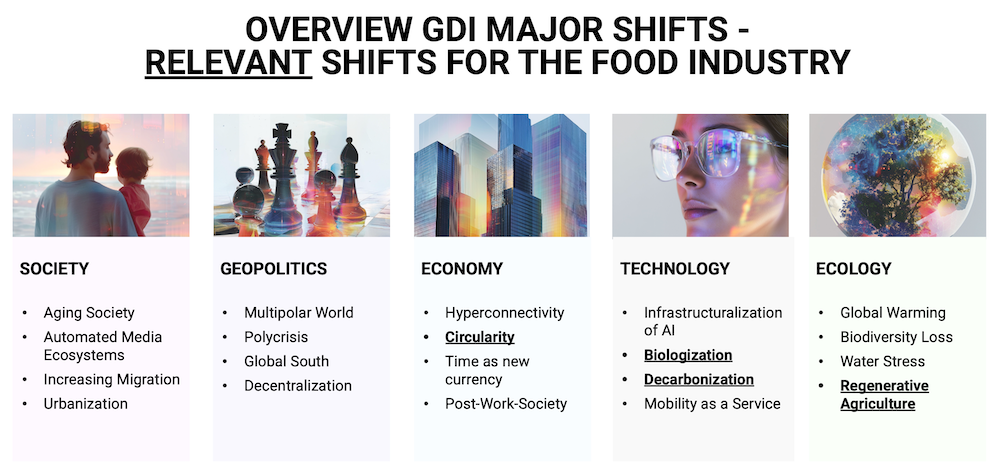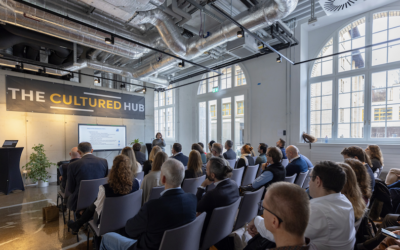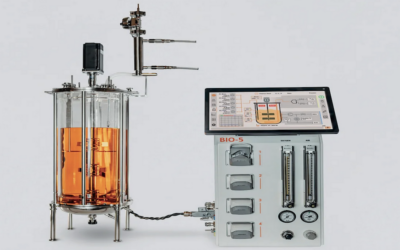What the food industry can learn from GDI’s Major Shifts model

The future is coming faster than many companies can keep pace with. This is especially true for actors in the food industry, as developments in STEM and climate change continue at speed. And nobody knows that better than the Gottlieb Duttweiler Institute (GDI). This is why GDI launched a report delving deeper into their latest foresight model – GDI Major Shifts.
In the world of food, understanding major global developments and interpreting plausible scenarios is vital for future planning and decision-making. That’s where the GDI’s latest report on their ‘Major Shifts’ model – which combines data-based analysis and interpretations to predict plausible future outcomes – comes in particularly useful. Identifying and explaining dynamic developments across sectors, the team at Switzerland’s oldest think tank shared a taste of what the food industry can learn from their analysis.
GDI Major Shifts: An Overview
The GDI team identified 20 key shifts in five categories – society, technology, economy, environment and politics – and analysed their life cycles. The implications identified provide companies with precise and realistic indicators for successful long-term planning and alignment with future trends – as well as identifying business areas that will no longer be relevant.

Four key areas among the twenty major shifts have particular relevance for the food industry.
Circularity
The shift towards circularity is fundamentally changing the food sector. Circularity – closing resource loops and minimizing waste – has become a key driver of innovation and competitiveness:
- Waste as a resource: Companies are transforming food by-products into new ingredients and products, reducing landfill and creating added value.
- Regenerative supply chains: Circular models prioritize regenerative agriculture, compostable packaging, and reusable systems, restoring ecosystems and reducing environmental impact.
- New business models: The demand for zero-waste and circular solutions is fueling innovations such as upcycled foods, refill systems, and digital platforms for food redistribution.
Biologisation
Biologisation marks the transition from mechanical and industrial approaches to biological and organic solutions. In the food sector, this means a shift toward:
- Bio-based ingredients and production: Expect a surge in foods produced using fermentation, cultured cells, or engineered microorganisms. These technologies promise more sustainable, resource-efficient alternatives to traditional agriculture.
- Convergence of biology and technology: The integration of biotech, data science, and engineering will enable personalized nutrition, precision fermentation, and new functional foods tailored to individual health profiles.
- Sustainability as a core driver: As the demand for climate-friendly, ethically produced food grows, companies that embrace biotechnological innovation will set new industry standards and capture emerging markets.
Decarbonisation
The pressure on the food sector to reduce its CO₂ footprint is increasing rapidly.
- Decarbonisation – the transition from fossil fuels to renewable, carbon-free energy sources – is becoming a key competitive factor:
- Climate-neutral production: Food manufacturers are investing in renewable energy, electrifying processes, and adopting low-carbon logistics to reduce emissions along the entire value chain.
- Transparency and reporting: More and more consumers and business partners are demanding proof of the climate impact of products. Companies that transparently disclose and reduce their emissions strengthen their market position.
- New business models: The demand for climate-friendly products is creating space for innovation – from CO₂-neutral brands to climate-conscious gastronomy and sustainable delivery services.
Regenerative agriculture
Regenerative agriculture is moving from a niche concept to a mainstream imperative. Its impact on the food industry includes:
- Supply chain transformation: Food companies are increasingly investing in regenerative practices that restore soil health, boost biodiversity, and sequester carbon. This not only mitigates environmental impact but also addresses growing consumer demand for transparency and sustainability.
- Shorter, more transparent value chains: Regenerative models favor local sourcing, traceability, and direct relationships between producers and consumers, challenging the dominance of globalized, opaque supply chains.
- Competitive advantages through ecosystem stewardship: Brands that adopt regenerative principles are poised to lead, as regulatory pressure and investor expectations around sustainability intensify.
The main takeaway?
The companies who invest now in biotechnology, regenerative systems, circularity and decarbonisation – which analysis shows are heavily interlinked – will secure a pole position in the food market of the future. The next food revolution will be organic, regenerative and circular.
Eager to dive deeper? Contact Susan Shaw, Head of Strategic Foresight at GDI.
About the Gottlieb Duttweiler Institute (GDI)
The Gottlieb Duttweiler Institute (GDI) is Switzerland’s oldest think-tank. A place of inspiration and innovation where strategic visions are expounded, the GDI provides a forum for key decision-makers to shape the future of the economy and society. The GDI unites research and industry-relevant applications to define path-breaking strategies in tandem with business. This institute, which operates independently, is supported by the Migros Culture Percentage.
Sign up for quarterly Swiss food innovation updates.
Latest News
The Cultured Hub unveils plant cell culturing for cocoa, coffee, and other ingredients
Valley partner, The Cultured Hub, has...
Pow.Bio and Bühler join forces to advance next-generation precision fermentation
Pow.Bio, the pioneer in AI-enabled...
The perfect mix of talent and tech: empowering startups in the Swiss food ecosystem
Innovation succeeds when the right...
Tetra Pak acquires Bioreactors.net to accelerate solutions for New Food
Tetra Pak Processing Equipment...



